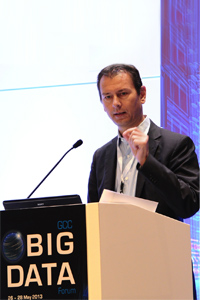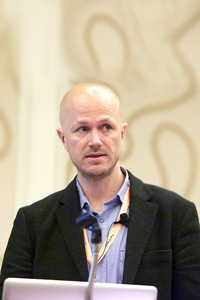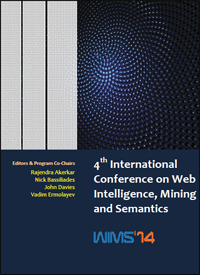Large-Scale Reasoning with (Semantic) Data*
Grigoris Antoniou, Professor, University of Huddersfield
Abstract: In this talk we discuss scalable methods for nonmonotonic rule-based reasoning over Semantic Web Data, using MapReduce. This work is motivated by the recent unparalleled explosion of available data coming from the Web, sensor readings, databases, ontologies and more. Such datasets could benefit from the introduction of rule sets encoding commonly accepted rules or facts, application- or domain-specific rules, commonsense knowledge etc. This raises the question of whether, how, and to what extent knowledge representation methods are capable of handling huge amounts of data for these applications. Our results indicate that our method shows good scalability properties and is able to handle a benchmark dataset of 1 billion triples, bringing it on par with state-of-the-art methods for monotonic reasoning on the semantic web.
 Short CV: Grigoris Antoniou is Professor of Semantic and Knowledge Technologies at the University of Huddersfield. His main research interests are knowledge representation and reasoning, semantic web technologies and their applications in various domains. He has published over 200 papers and three books, including “A Semantic Web Primer” by MIT Press, now in its 3rd edition. He participates in a number of European projects, including the PlanetData Network of Excellence, PRELIDA Coordination Action and SemData International Research Exchange. He has been Program Committee and Conference Chair of ESWC 2010 and ESWC 2011, respectively. He is an ECCAI Fellow since 2006.
Short CV: Grigoris Antoniou is Professor of Semantic and Knowledge Technologies at the University of Huddersfield. His main research interests are knowledge representation and reasoning, semantic web technologies and their applications in various domains. He has published over 200 papers and three books, including “A Semantic Web Primer” by MIT Press, now in its 3rd edition. He participates in a number of European projects, including the PlanetData Network of Excellence, PRELIDA Coordination Action and SemData International Research Exchange. He has been Program Committee and Conference Chair of ESWC 2010 and ESWC 2011, respectively. He is an ECCAI Fellow since 2006.
BIG DATA – from Hype to Reality
Richard Benjamins, Director of Business Intelligence, Telefonica
Abstract: The traditional world of relational databases and enterprise data warehouses is being challenged by growth in data volumes, the rise of unstructured and semi-structured data, and the desire to extract more valuable business insights. In order to remain competitive: we are entering the world of ‘BIG DATA’. Scale-out, commodity hardware-based solutions based on the map-reduce programming model for parallel processing on large hardware are emerging to address these BIG DATA requirements that have challenged traditional technologies. In this talk I will focus on the potential business value to be created in this area by describing the opportunities and risks arising from the recent emergence of BIG DATA Analytics technology for companies. Then I will discuss the role businesses can play in BIG DATA, and finally I will explain Telefonica’s experience in applying BIG DATA technology, both internally for enhancement of its own business processes and externally, where we are applying the technology to benefit our customers directly.
 Short CV: Dr. V.R. (Richard) Benjamins is Director of Business Intelligence at Telefonica Digital, the newly created digital branch of Telefoncia. Before that he held various positions in Telefonica including director of Global BI programs and Director of User Modelling. Richard is a frequent speaker on big data, BI and analytics events. Previously he was Director of Technological Strategy at the same company, which he joined in July 2007.
Short CV: Dr. V.R. (Richard) Benjamins is Director of Business Intelligence at Telefonica Digital, the newly created digital branch of Telefoncia. Before that he held various positions in Telefonica including director of Global BI programs and Director of User Modelling. Richard is a frequent speaker on big data, BI and analytics events. Previously he was Director of Technological Strategy at the same company, which he joined in July 2007.
Before that he was co-founder, director and board member at Intelligent Software Components (iSOCO), and he led its international positioning as a Semantic Web company. Based on his work, iSOCO were granted the National Award for Computer Science. Dr. Benjamins has held positions at the Technical University of Madrid, the University of Amsterdam, the University of Sao Paulo, Brazil, the University of Paris-South, France, and the Spanish Artificial Intelligence Research Institute in Barcelona.
He has published over 100 scientific articles in books, journals and proceedings, covering areas such as artificial intelligence, knowledge-based systems, semantic web and technology transfer. He has been guest editor of several journal special-issues and co-chair of numerous international workshops and conferences. He is on advisory boards of several start-ups and international research projects. He is general chair of the K-CAP 2013 Conference.
Semantic Technology for online, broadcast and print media
Jem Rayfield, Head Architect, Financial Times
Abstract: This talk will describe the Financial Times use of Semantic Technology to power its online and print product portfolio. I will provide an insight into the Financial Times technical strategy which aims to deprecate a Relational, Taxonomical and Search driven architecture towards a new Semantic, Search and Document centric architecture. An overview of the architectural approach used to deliver the BBC’s Sport and Olympics services will also be provided.
 Short CV: Jem Rayfield is Head of Solution Architecture at the Financial Times. This places him at the centre of the FT’s online architectural strategy, governance and implementation decisions. He is currently re-platforming the FT’s publishing stack, moving the incumbent architecture towards dynamic semantic publishing.
Short CV: Jem Rayfield is Head of Solution Architecture at the Financial Times. This places him at the centre of the FT’s online architectural strategy, governance and implementation decisions. He is currently re-platforming the FT’s publishing stack, moving the incumbent architecture towards dynamic semantic publishing.
Prior to working at the FT, Jem was Lead Technical Architect within the News and Knowledge Department at the BBC. In his free time, Jem enjoys listening and playing (badly) a wide and eclectic range of music. He also enjoys spending time at the gym.
Social Networks: Evolving data mining and Sentiment Analytics*
Athena Vakali, Professor, Aristotle University of Thessaloniki
Abstract: Social networks drive today’s opinions and content diffusion. Large scale, distributed and unpredictable social data streams are produced and such evolving data production offers the ground for the data mining and analysis tasks. Such social data streams embed human reactions and inter-relationships and affective and emotional analysis has become rather important in today’s applications. This talk highlights the major data structures and methodologies used in evolving social data mining and proceeds to the relevant affective analysis techniques. A particular framework is outlined along with indicative applications which employ evolving social data analysis with emphasis on the seminal criteria of topic, location and time. Such mining and analysis overview is beneficial for various scientific and entrepreneurial audiences and communities in the social networking area.
 Short CV: Athena Vakali has been a faculty member (now an associate professor, elected to become professor) in the Department of Informatics at the Aristotle University of Thessaloniki since 1997. She is heading the Operating Systems Web/INternet Data Sources Management research group “OSWINDS” (http://oswinds.csd.auth.gr). Her research activities are on various aspects and topics of the Web information systems, including Web data management (clustering techniques), content delivery on the Web, Web data clustering, Web caching, XML-based authorization models, text mining and multimedia data management. Her publication record is now at more than 100 research publications which have appeared in several journals (e.g CACM, IEEE Internet Computing, WWWJ), book chapters and in scientific conferences (e.g., IDEAS, ADBIS, ISCIS, ISMIS etc.). In March 2004, she co-organized the EDBT-Workshop on Clustering Information over the Web (ClustWeb), in the IX Conference on Extending Database Technology (EDBT) in Heraclion, Greece. In April 2005 and April 2006, she co-organized the ICDE Workshops on Challenges in Web Information Retrieval and Integration (WIRI), in Tokyo (Japan) and in Atlanta (USA) respectively. She is regular reviewer in major Web data management conferences (i.e., ECML/PKDD, EDBT, CoopIS, DASFAA) and journals (i.e., IEEE Internet Computing, IEEE TKDE, DKE). She is also co-editor of the book “Web Data Management Practices: Emerging Techniques and Technologies” published by Idea Group Publishing. She is a member of the editorial board of the Computers and Electrical Engineering Journal (Elsevier) and since March 2007, she is the coordinator of the IEEE TCSC technical area of Content Management and Delivery Networks.
Short CV: Athena Vakali has been a faculty member (now an associate professor, elected to become professor) in the Department of Informatics at the Aristotle University of Thessaloniki since 1997. She is heading the Operating Systems Web/INternet Data Sources Management research group “OSWINDS” (http://oswinds.csd.auth.gr). Her research activities are on various aspects and topics of the Web information systems, including Web data management (clustering techniques), content delivery on the Web, Web data clustering, Web caching, XML-based authorization models, text mining and multimedia data management. Her publication record is now at more than 100 research publications which have appeared in several journals (e.g CACM, IEEE Internet Computing, WWWJ), book chapters and in scientific conferences (e.g., IDEAS, ADBIS, ISCIS, ISMIS etc.). In March 2004, she co-organized the EDBT-Workshop on Clustering Information over the Web (ClustWeb), in the IX Conference on Extending Database Technology (EDBT) in Heraclion, Greece. In April 2005 and April 2006, she co-organized the ICDE Workshops on Challenges in Web Information Retrieval and Integration (WIRI), in Tokyo (Japan) and in Atlanta (USA) respectively. She is regular reviewer in major Web data management conferences (i.e., ECML/PKDD, EDBT, CoopIS, DASFAA) and journals (i.e., IEEE Internet Computing, IEEE TKDE, DKE). She is also co-editor of the book “Web Data Management Practices: Emerging Techniques and Technologies” published by Idea Group Publishing. She is a member of the editorial board of the Computers and Electrical Engineering Journal (Elsevier) and since March 2007, she is the coordinator of the IEEE TCSC technical area of Content Management and Delivery Networks.











